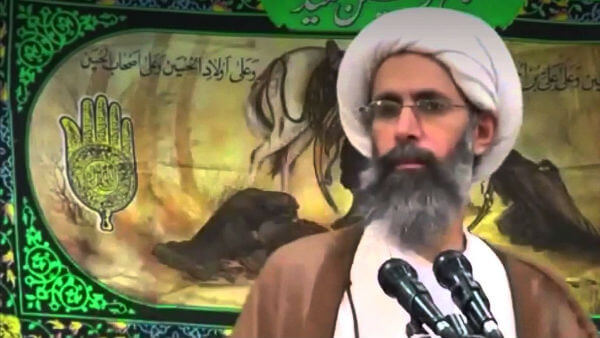
The Washington Post reports: Saudi Arabia severed relations with Iran on Sunday amid the furor that erupted over the execution by the Saudi authorities of a prominent Shiite cleric.
Foreign Minister Adel al-Jubair told reporters in Riyadh that the Iranian ambassador to Saudi Arabia had been given 48 hours to leave the country, citing concerns that Tehran’s Shiite government was undermining the security of the Sunni kingdom.
Saudi Arabian diplomats had already departed Iran after angry mobs trashed and burned the Saudi embassy in Tehran overnight Saturday, in response to the execution of Sheikh Nimr Baqr al-Nimr earlier in the day.
Iran’s Supreme Leader warned on Sunday that there would be divine retribution for Saudi Arabia’s rulers after the execution of a renowned Shiite cleric, sustaining the soaring regional tensions that erupted in the wake of the killing.
The warning came hours after crowds of protesters stormed and torched the Saudi embassy in Tehran to vent their anger at the execution of Nimr Baqr al-Nimr, who was among 47 people put to death in the kingdom on Saturday.
Shiites around the world expressed outrage, potentially complicating a surge of U.S. diplomacy aimed at bringing peace to the region, according to Toby Matthiesen, an expert on Saudi Arabia at the University of Oxford.
“Nimr had become a household name amongst Shiite Muslims around the world. Many had thought his execution would be a red line and would further inflame sectarian tensions,” he said. “So this will complicate a whole range of issues, from the Syrian crisis to Yemen.”
Saudi Arabia and Iran are backing rival sides in Syria’s war, and their enmity risks derailing a diplomatic effort led by the United States and Russia to convene peace talks between the factions in Geneva this month.
The two feuding powers also support opposing sides in the war in Yemen and more broadly find themselves in opposition in the deeply divided politics of the mixed Sunni-Shiite nations of Iraq and Lebanon.
The Obama administration’s hopes that the conclusion last summer of an agreement limiting Iran’s nuclear program would help bridge the sectarian divide between Tehran and the United States’ biggest Arab ally were further diminished by the eruption of fury that followed Nimr’s death. [Continue reading…]


It’s ironic that you’re hope for Syria is a Lebanon-style agreement, because such a scenario requires Russia’s active intervention. A 50-50 sectarian divide is relatively stable, but a 90-10 split clearly is not. Somebody has to contain Saudi Arabia, and it’s not going to be us.
MI6’s Richard Dearlove once quoted Prince Bandar as saying that it will soon be “God help the Shia. More than a billion Muslims have simply had enough of them.” Bandar’s gone, but his mindset remains.
So to answer your question from another post, I do think something worse can replace the Alawite regime. A Sunni jihadist government funded by the Gulf monarchies can be worse. It would probably go on to destabilize Lebanon, and it would be a terrorist threat to other countries.
The Saudis’ execution of this cleric is a clear message to all Shia: keep fighting. You can expect no mercy from the monarchy-backed “moderate” rebels.
Can you explain how the Saudi’s execution of what is reported as 47 individuals, including
the Shiite holy man and activist …..It is so appalling. How can we (USA) continue to
be allies with a country where that happens? Is it the least bad of bad choices?
Can we (USA) disconnect from them? Do we have a moral imperative to do so?
Sounds like you imagine the primary interventionist powers in Syria — Iran and Russia — are also the forces of stability. That’s a strange perspective, given their long-running involvement in the war and given the near collapse of the Syrian state.
In saying this, I’m not implying that the Saudi rulers have a positive influence anywhere in the region.
At the same time, while the xenophobic right promotes fear of all Muslims, the left has its own version of Islamophobia that focuses on the Saudis.
Naturally, the Saudis invite comparisons with ISIS when they stage mass executions, but we shouldn’t forget that the region’s leading executioner is Iran — nearly 700 in just over six months last year.
It might look like Sheikh Nimr al-Nimr’s execution was conceived as a provocation to all Shia, but it seems much more likely that this decision was based on domestic considerations — see Angus McDowell’s analysis.
The clearest explanation I’ve seen so far on why the Saudis carried out this mass execution comes in this succinct analysis from Angus McDowell.
A popular narrative these days is that the Saudis are at the heart of all the Middle East’s problems as a result of their exporting Wahhabism. There is an element of truth to this but it would be a mistake to think that severing all ties to Saudi Arabia would improve the situation.
What’s ironic about the current situation is that there are those who are warning about the risk of Syria becoming a jihadist state and they view the Saudis as the primary exporters of jihadism. Anyone worried about the creation of a jihadist state should actually be looking at that risk for Saudi Arabia itself. In saying this, I’m not justifying mass executions, nor the support of a corrupt monarchy, but I do think it’s wrong to imagine that U.S. disengagement would improve the situation.
Because of America’s miserable history of interference in the Middle East, it’s easy to believe that U.S. disengagement would be a panacea, yet what anyone should be asking is this: in the absence of American influence, which state is going to start wielding more constructive influence across the region? Iran? Saudi Arabia? Russia? China?